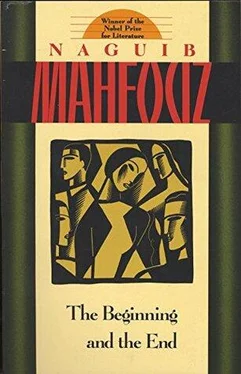Naguib Mahfouz - The Beginning and the End
Здесь есть возможность читать онлайн «Naguib Mahfouz - The Beginning and the End» весь текст электронной книги совершенно бесплатно (целиком полную версию без сокращений). В некоторых случаях можно слушать аудио, скачать через торрент в формате fb2 и присутствует краткое содержание. Год выпуска: 2016, Издательство: Anchor Books, Жанр: Классическая проза, на английском языке. Описание произведения, (предисловие) а так же отзывы посетителей доступны на портале библиотеки ЛибКат.
- Название:The Beginning and the End
- Автор:
- Издательство:Anchor Books
- Жанр:
- Год:2016
- ISBN:нет данных
- Рейтинг книги:4 / 5. Голосов: 1
-
Избранное:Добавить в избранное
- Отзывы:
-
Ваша оценка:
- 80
- 1
- 2
- 3
- 4
- 5
The Beginning and the End: краткое содержание, описание и аннотация
Предлагаем к чтению аннотацию, описание, краткое содержание или предисловие (зависит от того, что написал сам автор книги «The Beginning and the End»). Если вы не нашли необходимую информацию о книге — напишите в комментариях, мы постараемся отыскать её.
The Beginning and the End — читать онлайн бесплатно полную книгу (весь текст) целиком
Ниже представлен текст книги, разбитый по страницам. Система сохранения места последней прочитанной страницы, позволяет с удобством читать онлайн бесплатно книгу «The Beginning and the End», без необходимости каждый раз заново искать на чём Вы остановились. Поставьте закладку, и сможете в любой момент перейти на страницу, на которой закончили чтение.
Интервал:
Закладка:
She hurried to the door of the room and opened it. Through the open door of the sitting room, she saw her mother standing at the threshold and the merchant with his men carrying the long mirror outside. The man carrying one end of the mirror was shorter than the other; thus the mirror was being carried in a slanting position. On the surface of it, she could see a reflection of a corner of the hall ceiling, swinging, as the legs of the carriers moved, as though the house were shaken by an earthquake. Unconsciously, the memory of her father’s bier struck her again. As she cast a last look on the mirror which she had known ever since her birth, she became even more depressed than before. She went back to her sitting place, thinking: The mirror should be the last thing I should feel sorry for. It will not reflect a pleasant face for me. “A sweet temper is more precious than beauty.” You are the only person to say so, Father. But for me, you would have never said it. I have no beauty, no money, and no father. There were only two hearts that were concerned over my future. One is dead and the other is engrossed in its worries, and I am terribly lonely, desperate, and suffering. I am twenty-three years old. How dreadful! When our circumstances were much better, no husband put in an appearance. How is it possible, then, that a husband will turn up today or tomorrow?! Suppose that such a husband agrees to be married to a dressmaker, who will pay my marriage expenses? Why should I think of a husband and marriage? No use. No use. I shall remain as I am as long as I live.
There was a knock on the door, and the landlady came in as merry as ever. She embraced Nefisa and kissed her. They sat side by side. The woman spoke to the girl tenderly and affectionately. Perhaps she made a point of being more tender and affectionate than was her custom. To hide her shyness and confusion, Nefisa pretended to be pleased and at ease, but actually the woman’s exaggerated show of affection not only hurt her deeply but also doubled her shyness and confusion. The woman tried on the dress and the underwear Nefisa had finished. Then she sat close to Nefisa and placed silver coins in her hand.
“It is impossible for me,” she said, “to pay off my past debts to you.”
After remaining with her for some time, the woman said goodbye and departed. Nefisa unfolded the palm of her hand to find two ten-piaster pieces. With storm and agitation in her heart, she stared at the coins. Overwhelmed by shame and humiliation, she thought: This is painful, but I should not think of it. What use is there in breaking my heart over it? I have to train myself to accept the inevitable. This is my life, and there is no alternative to it.
Her mother came in while she was still staring at the money and took it from Nefisa’s hand.
“Is this money for all the clothes or only for the dress?”
“I don’t know.”
The mother swallowed with difficulty. “They are good wages anyhow,” she said, taking care that the expression on her face should not betray her feelings.
FOURTEEN
Some weeks passed. The curtain of the night fell; melancholy and a kind of silence permeated the flat. The two brothers sat at the desk facing each other, busy studying their lessons. To economize, Nefisa and her mother sat in the hall in semi-darkness, seeing only with the aid of whatever light emerged from the boys’ room. Mother and daughter, as was their habit every evening, spoke quietly. Most of their conversation revolved about the troubles of life. Since poverty was still their major preoccupation, the older woman was fear-stricken. She viewed the future with profound worry and sadness. However, they were getting accustomed to their circumstances. Austerity in food was no longer as disturbing as it had been at the beginning. Nefisa began to adapt herself to her new occupation, yearning, with some humiliation and a great deal of hope, for new customers. Hussein and Hassanein had gotten used to relying on the school meal as a substitute for dinner and, stoically, went to bed as a substitute for supper. The force of habit overcame their initial humiliation, and Samira’s dominating firmness helped to keep the nerves of her afflicted family in check.
That evening Farid Effendi and his wife came to visit them. Samira and Nefisa welcomed the visitors and led them to the sitting room. The two felt quite at home as they entered, Farid Effendi wearing an overcoat over his gown, and his wife a dressing gown. To accommodate his obesity, the man sat on the sofa. He spoke softly, affectionately, and entertainingly. Um Bahia, his wife, was rather short and as plump as he; yet because of her blue eyes and pale complexion, she was considered the most beautiful woman in the building. Gently reproaching Samira, she asked her, “Why do you stay at home the way you do? Why don’t you get some relief by visiting us as you used to?”
“The cold of the winter assails us,” the mother replied. “In the evening, we grow lazy, and in the course of the day the burdens of managing the house never leave us an hour’s rest.”
“We are one family,” said Farid Effendi, “so we ought to spend most of our leisure time together.”
Farid Effendi was the type of man who never left his home except in cases of emergency. He spent his leisure time squatting on the sofa, surrounded by his wife, his daughter Bahia, and his younger son Salem. They told stories, chewed sugarcane, and roasted chestnuts. Samira felt genuine affection for his kind and generous heart. She never forgot his care and thoughtful assistance on the day of her husband’s death. In addition, he had lent her some money until she received her husband’s pension. He never failed to go to the Ministry of Finance to inquire about the pension and give the papers a push. But contrary to her flattering notion of his position, he was just a minor official, promoted only recently to the sixth grade when he reached the age of fifty. His neighborly relations with the dead man’s family went far back, and ties of friendship between the two families were strengthened by their mutual good-naturedness and similar standards of living. Theirs was not a bad life, nor was it devoid of entertainment. The family of the late Kamel Effendi had enjoyed new prosperity when he had been promoted to the sixth grade, five years before his death. Farid Effendi had entered on a new era two years earlier when he inherited a house in El Saida Zeinab, which brought a monthly rental of ten pounds. Thus his income had amounted to twenty-eight pounds a month, which was considered very substantial in 1933. Farid Effendi became master of Nasr Allah alley, grew fatter than ever, and if not for his wife’s insistence on saving for the future of their daughter and young son, he would have satisfied his desire to move into a flat on Shubra Street.
Their conversation ranged widely, and then Farid Effendi expressed a wish which was probably the chief reason for his visit.
“Madam, I ask you to do me a favor.”
“Anything you wish, sir,” Samira replied.
“My son Salem, who is in the third year of primary school, is weak in English and arithmetic. Teachers being greedy, as you know, I have thought, with a view to economizing, of asking Hussein and Hassanein to undertake the job of tutoring him for an hour a day or every other day. This is the favor I am asking, Um Hassan.”
Samira realized what the man was offering: a face-saving means of assisting her sons by providing them with a monthly supply of pocket money. This was as clear as broad daylight, and in keeping with the man’s gentle, kindly character. “Hussein and Hassanein are your sons, and both are at your disposal,” she said softly and shyly.
“They will really be helping me out. I hope they can start next Friday,” he replied happily.
Читать дальшеИнтервал:
Закладка:
Похожие книги на «The Beginning and the End»
Представляем Вашему вниманию похожие книги на «The Beginning and the End» списком для выбора. Мы отобрали схожую по названию и смыслу литературу в надежде предоставить читателям больше вариантов отыскать новые, интересные, ещё непрочитанные произведения.
Обсуждение, отзывы о книге «The Beginning and the End» и просто собственные мнения читателей. Оставьте ваши комментарии, напишите, что Вы думаете о произведении, его смысле или главных героях. Укажите что конкретно понравилось, а что нет, и почему Вы так считаете.












